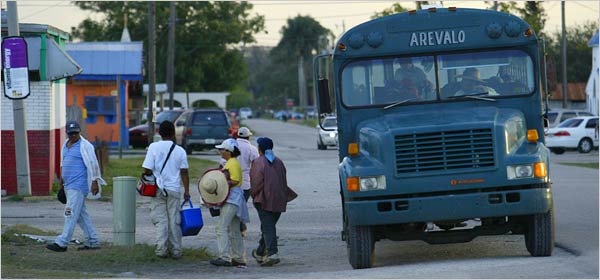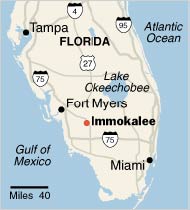From the Open-Publishing Calendar
From the Open-Publishing Newswire
Indybay Feature
Tomato Pickers’ Wages Fight Faces Obstacles
Just as the Ghost of Christmas Yet to Come would not let Ebeneezer Scrooge sleep on that fabled Christmas Eve nearly 150 years ago, an article in the Christmas Eve edition of the New York Times surely left Burger King's ambitious young CEO John Chidsey tossing last night!

photo: Alex Quesada for The New York Times. [Migrant workers in Immokalee, Fla., getting off a bus at the end of a workday.]
By STEVEN GREENHOUSE
Published: December 24, 2007
IMMOKALEE, Fla. — In a colorful, often clamorous pressure campaign that has relied on support from college campuses and church groups, a group of farmworkers has persuaded McDonald’s and Taco Bell to have their tomato suppliers pay their pickers more.
But the workers’ efforts have recently collided with two big obstacles. Burger King has rejected the demands to have its tomato suppliers pay higher wages, and the main group of Florida tomato growers — calling the farmworkers’ tactics “un-American” — has threatened a $100,000 fine against growers that cooperate with McDonald’s or Yum Brands, the parent of Taco Bell, to pay their pickers more.
“The only way you can describe this industry is the way it was described 40 years ago: It’s a harvest of shame,” said Lucas Benitez, a co-founder of the farmworkers’ group, the Coalition of Immokalee Workers. “The wages are so low that a lot of workers are just surviving.”
Steve Grover, vice president for food safety and regulatory compliance at Burger King, said his company rejected the coalition’s demands because it did not employ the pickers directly and did not know how it would pay them, withhold their taxes or determine their immigration status.
“We’re being asked to do something that we have legal questions about,” Mr. Grover said. “We want to find a way to make sure that workers are protected and receive a decent wage.”
Immokalee (which rhymes with broccoli) is 25 miles inland from Fort Myers and seems an unlikely place for a self-proclaimed “fair food movement” to begin. Its downtown is cluttered with rundown trailers and ramshackle shacks where immigrant field hands often sleep three or four to a room.
The farmworkers’ coalition has garnered financial support from a dozen foundations and public support from former President Jimmy Carter; Ethel Kennedy, Robert F. Kennedy’s widow; the National Council of Churches; and the Presbyterian Church.
On Nov. 30, the coalition attracted more than 1,000 participants to a nine-mile march in Miami that began at the Goldman Sachs office — Goldman is one of Burger King’s largest shareholders — and ended at Burger King’s corporate headquarters. Many signs said, “End sweatshops in the fields,” and many marchers wore yellow T-shirts with the logo “Exploitation King.”
They wanted Burger King to agree to pay pickers a penny more per pound — increasing their wage to 77 cents from 45 cents per 32-pound bucket of tomatoes, up from 40 cents in 1980. Professors at Florida International University estimated the state’s farm workers average $13,000 annually.
A bigger obstacle to the coalition’s efforts is the Florida Tomato Growers Exchange, a cooperative representing 90 percent of the state’s growers. It has threatened large “noncompliance penalties” for any growers that share information about wages or tonnage picked with third parties like McDonald’s. Florida grows 85 percent of the nation’s winter tomatoes.
Reggie Brown, the exchange’s executive vice president, said his group’s lawyers said the Coalition of Immokalee Workers violated antitrust laws in joining with Yum Brands and McDonald’s to get tomato growers to pay higher wages.
“I think it is un-American when you get people outside your business to dictate terms of business to you, to tell you to do something that your lawyers tell you is illegal,” Mr. Brown said.
But Mark Barenberg, a law professor at Columbia University, said, “The only possible antitrust violation is by the growers since they seem to be conspiring among themselves to refuse to deal with fast-food companies that want to buy supplies made under certain specifications.”
Mr. Brown disputed assertions that the tomato pickers were ill paid, saying that they averaged $12.46 an hour, and that did not include free transportation to the fields.
Angel Aguilar, a 36-year-old picker from Mexico, said: “It’s a gigantic lie to say we earn $12.46 an hour. If they were to ask all of us, who earns $12.46 an hour, nobody would raise their hands.”
He said he generally earned $40 to $50 a day for five to seven hours of picking, often taking home $200 to $250 a week. The pickers’ days often begin at 5 a.m. when they arrive at a downtown parking lot in the hope of being chosen for a crew. The labor contractors’ buses typically leave for the field at 6, arriving shortly before 7. The workers often do not begin picking until 10 or 11 because they are required to wait for the dew to burn off. They usually arrive back at the parking lot at 5 or 6 p.m.
Many live in bare-bones trailers a short walk from the parking lot, often paying weekly rent of $50 per person. A landlord whose trailer holds eight migrants will often receive $400 a week or nearly $1,800 a month. In many trailers, workers hang their food from a wire to prevent rats from getting at it.
As a result of the agreement the coalition reached with Yum Brands two years ago (after a four-year fight that included a boycott), many pickers receive an extra $5 to $25 some weeks. If 10 percent of a farm’s tonnage is sold to Taco Bell in a particular week, then the workers would receive a pay supplement on 10 percent of what they picked.
The coalition’s hope is that all purchasers will eventually agree to the penny-a-pound increase.
McDonald’s was scheduled to begin paying the higher wage this winter, but its effort and Yum Brands’ were suspended because growers pulled out after the exchange threatened fines. McDonald’s and Yum Brands say they are still eager to carry out their agreement with the coalition.
“It’s been our position all along that others need to step up and do more,” said William Whitman, a McDonald’s spokesman.
Mr. Brown of the Tomato Growers Exchange said the Immokalee coalition had improperly branded the growers as stingy and exploitative. “If we weren’t paying a very competitive wage and giving these workers enough money to send to their families in Mexico and Central America, we wouldn’t be able to attract a labor force,” he said.
But the Rev. Noelle Damico, national coordinator of the Campaign for Fair Food for the Presbyterian Church, said the church planned to continue putting pressure on Burger King and the Tomato Growers Exchange to increase wages.
“For years we’ve provided charity to farmworkers in South Florida, and we started asking, ‘Why are farmworkers who work six days a week and often 10 or 12 hours a day still needing help from charity?’” she said. “We saw that something was very wrong.”
By STEVEN GREENHOUSE
Published: December 24, 2007
IMMOKALEE, Fla. — In a colorful, often clamorous pressure campaign that has relied on support from college campuses and church groups, a group of farmworkers has persuaded McDonald’s and Taco Bell to have their tomato suppliers pay their pickers more.
But the workers’ efforts have recently collided with two big obstacles. Burger King has rejected the demands to have its tomato suppliers pay higher wages, and the main group of Florida tomato growers — calling the farmworkers’ tactics “un-American” — has threatened a $100,000 fine against growers that cooperate with McDonald’s or Yum Brands, the parent of Taco Bell, to pay their pickers more.
“The only way you can describe this industry is the way it was described 40 years ago: It’s a harvest of shame,” said Lucas Benitez, a co-founder of the farmworkers’ group, the Coalition of Immokalee Workers. “The wages are so low that a lot of workers are just surviving.”
Steve Grover, vice president for food safety and regulatory compliance at Burger King, said his company rejected the coalition’s demands because it did not employ the pickers directly and did not know how it would pay them, withhold their taxes or determine their immigration status.
“We’re being asked to do something that we have legal questions about,” Mr. Grover said. “We want to find a way to make sure that workers are protected and receive a decent wage.”
Immokalee (which rhymes with broccoli) is 25 miles inland from Fort Myers and seems an unlikely place for a self-proclaimed “fair food movement” to begin. Its downtown is cluttered with rundown trailers and ramshackle shacks where immigrant field hands often sleep three or four to a room.
The farmworkers’ coalition has garnered financial support from a dozen foundations and public support from former President Jimmy Carter; Ethel Kennedy, Robert F. Kennedy’s widow; the National Council of Churches; and the Presbyterian Church.
On Nov. 30, the coalition attracted more than 1,000 participants to a nine-mile march in Miami that began at the Goldman Sachs office — Goldman is one of Burger King’s largest shareholders — and ended at Burger King’s corporate headquarters. Many signs said, “End sweatshops in the fields,” and many marchers wore yellow T-shirts with the logo “Exploitation King.”
They wanted Burger King to agree to pay pickers a penny more per pound — increasing their wage to 77 cents from 45 cents per 32-pound bucket of tomatoes, up from 40 cents in 1980. Professors at Florida International University estimated the state’s farm workers average $13,000 annually.
A bigger obstacle to the coalition’s efforts is the Florida Tomato Growers Exchange, a cooperative representing 90 percent of the state’s growers. It has threatened large “noncompliance penalties” for any growers that share information about wages or tonnage picked with third parties like McDonald’s. Florida grows 85 percent of the nation’s winter tomatoes.
Reggie Brown, the exchange’s executive vice president, said his group’s lawyers said the Coalition of Immokalee Workers violated antitrust laws in joining with Yum Brands and McDonald’s to get tomato growers to pay higher wages.
“I think it is un-American when you get people outside your business to dictate terms of business to you, to tell you to do something that your lawyers tell you is illegal,” Mr. Brown said.
But Mark Barenberg, a law professor at Columbia University, said, “The only possible antitrust violation is by the growers since they seem to be conspiring among themselves to refuse to deal with fast-food companies that want to buy supplies made under certain specifications.”
Mr. Brown disputed assertions that the tomato pickers were ill paid, saying that they averaged $12.46 an hour, and that did not include free transportation to the fields.
Angel Aguilar, a 36-year-old picker from Mexico, said: “It’s a gigantic lie to say we earn $12.46 an hour. If they were to ask all of us, who earns $12.46 an hour, nobody would raise their hands.”
He said he generally earned $40 to $50 a day for five to seven hours of picking, often taking home $200 to $250 a week. The pickers’ days often begin at 5 a.m. when they arrive at a downtown parking lot in the hope of being chosen for a crew. The labor contractors’ buses typically leave for the field at 6, arriving shortly before 7. The workers often do not begin picking until 10 or 11 because they are required to wait for the dew to burn off. They usually arrive back at the parking lot at 5 or 6 p.m.
Many live in bare-bones trailers a short walk from the parking lot, often paying weekly rent of $50 per person. A landlord whose trailer holds eight migrants will often receive $400 a week or nearly $1,800 a month. In many trailers, workers hang their food from a wire to prevent rats from getting at it.
As a result of the agreement the coalition reached with Yum Brands two years ago (after a four-year fight that included a boycott), many pickers receive an extra $5 to $25 some weeks. If 10 percent of a farm’s tonnage is sold to Taco Bell in a particular week, then the workers would receive a pay supplement on 10 percent of what they picked.
The coalition’s hope is that all purchasers will eventually agree to the penny-a-pound increase.
McDonald’s was scheduled to begin paying the higher wage this winter, but its effort and Yum Brands’ were suspended because growers pulled out after the exchange threatened fines. McDonald’s and Yum Brands say they are still eager to carry out their agreement with the coalition.
“It’s been our position all along that others need to step up and do more,” said William Whitman, a McDonald’s spokesman.
Mr. Brown of the Tomato Growers Exchange said the Immokalee coalition had improperly branded the growers as stingy and exploitative. “If we weren’t paying a very competitive wage and giving these workers enough money to send to their families in Mexico and Central America, we wouldn’t be able to attract a labor force,” he said.
But the Rev. Noelle Damico, national coordinator of the Campaign for Fair Food for the Presbyterian Church, said the church planned to continue putting pressure on Burger King and the Tomato Growers Exchange to increase wages.
“For years we’ve provided charity to farmworkers in South Florida, and we started asking, ‘Why are farmworkers who work six days a week and often 10 or 12 hours a day still needing help from charity?’” she said. “We saw that something was very wrong.”
For more information:
http://www.nytimes.com/2007/12/24/us/24tom...
Add Your Comments
We are 100% volunteer and depend on your participation to sustain our efforts!
Get Involved
If you'd like to help with maintaining or developing the website, contact us.
Publish
Publish your stories and upcoming events on Indybay.
Topics
More
Search Indybay's Archives
Advanced Search
►
▼
IMC Network




